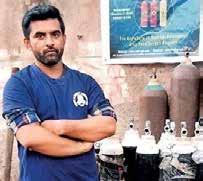Mayors’ Dialogues | Leadership & Pandemic Response
Mayors underlines issues, solutions of pandemic response
C
ities have suffered the most because of this coronavirus pandemic as the virus spreads rapidly in dense areas and our cities are dense. The health infrastructure in the metropolitan cities came under pressure when the pandemic came, and everyday new record highs got reported. The role of mayors in dealing with crisis of such a magnitude is crucial, they being the first representatives of their cities. Understanding how the 73rd and 74th amendment empowered the mayors and elected representatives and the loopholes in the system that can be revised or can be recommended to the government, All India Institute of Local Self-Government (AIILSG), in association with National Institute of Urban Affairs, organised the second instalment of “Mayors’ Dialogues”. ‘Leadership and Pandemic Response’ saw participation from Samyukta Bhatia, Mayor Lucknow; Govind Singh Tank, Mayor Udaipur, and Amarjot Singh Bedi, President, Una Municipal Committee and Pashim Tiwari, Technical Director, AIILSG. and Abhishek Pandey, Editor, Urban Update, moderated the dialogue. “No doubt cities have been the worst affected from the virus. This is why the role of mayors and elected representatives is very important in dealing with the crisis,” Abhishek Pandey said in his opening remarks. Talking about the role of elected representatives in making a city pandemic resilient, Pandey highlighted the administrative control and authority the mayors and public representative have and how its scope can be widened under the 73rd and 74th amendment of the Constitution. He further noted that there is need for a new governance model in the post pandemic world where the government and the urban local bodies work together in a coordinated manner. He then asked Pashim Tiwari to throw light on issues cities are facing because of the coronavirus pandemic.
38 July 2020 | www.urbanupdate.in
Tiwari noted that COVID-19 is just a symptom of larger issues existing in the urban scenario of India. India has always been a reluctant urbanizerand we have always looked at the rural side of India as strength and socio-cultural as well as socio-economicregion which needs to be taken care of. Urban centers were mostly neglected post-independence. But the COVID-19 crisis has put light on the challenges urban centers face and as Abhishek clearly mentioned, 28 years ago the 74th amendment was in a way a step to empower the cities so that they actually can become the engines of growth which we want them to be. Cities being the largest provider of economic activities for most of the country and the GDP, need to be empowered in a way that they can control their own fate, Tiwari said. One of the powerful amendments was the 74th amendment, which actually did not get implemented in letter and spirit. COVID-19 is one of such crises, which has given us an opportunity to revise these amendments along with the support of the local government. The mayors and public representatives who have the major role, are playing it very well and because of whom It can be said that this entire system is in place and capable of working together. After the welcome remarks delivered by Pandey and Tiwari, the mayors individually presented their experiences, grievances, and insights during the pandemic, which showed their leadership and pandemic response. Here are the major takeaways from their addresses:
Samyukta Bhatia Mayor, Lucknow
From the very day COVID-19 was reported in the country, we started preparing action plans with vice chancellors of various educational institutes to tackle the situation. Beds for corona patients in the hospitals were prepared before hand and no shortage of beds or need for extra beds was reported. Under the leadership of Yogi Adityanath, Chief Minister, Uttar Pradesh, the situation was managed
in a better and effective manner in comparison to other cities. The morale ofsanitation workers was also boosted during these times by the municipality and they were motivated to work twice a day. Ialso made an appeal to the people to honor these workers who are working tirelessly during these times and their confidence was lifted when the people, well known individuals and elected representatives started paying them respect. A community kitchen was started in Lucknowby the municipality which became an example for the entire state and other cities also started following the idea. Every section of society supported the initiative anda total of 80,000 food packets were distributedto the people in the city. The maximum amount as well the grains for these food packets was given by the people and as a result of which the municipality had to spend a smaller amount. With people’s support, municipality worked to better the crisis but they are not empowered enough under the 73rd and 74th amendment. The mayors and public representatives lack authority and administrative control; we hardly have any rights except for collection of house tax. Because of these pandemic times, there were not enough funds to pay the salaries of 8000 employees, their salaries were paid from the fund provided by the central government for development. I would like to suggest that more powers and rights should be given to the Municipal Committees as we face many challenges in terms of funds and facilities.
Amarjot Singh Bedi, President, Una Municipal Committee
The municipal committees are facing problems not only during this pandemic, but these problems have been existing since a long time. The powers of urban local bodies(ULBs) and panchayats have usually been diluted andthere has never been an intention to strengthen the ULBs. In Himachal Pradesh (HP), the crisis was easier to manage as the state is












